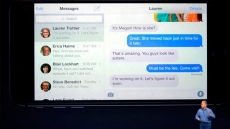Google CEO Sundar Pichai on Wednesday announced the team at Google AI has achieved sort of "quantum supremacy" with developing a chip that performed the target computation in 200 seconds, which would otherwise take the world's fastest supercomputer 10,000 years.
Published in the journal Nature, the Google AP paper said the team developed a new 54-qubit processor, named "Sycamore", that is comprised of fast, high-fidelity quantum logic gates, in order to perform the benchmark testing.
"Very proud that our @GoogleAI team has achieved a big breakthrough in quantum computing known as quantum supremacy after over a decade of work, as published in @Nature. Thank you to our collaborators in the research community who helped make this possible," tweeted Pichai.
The quantum supremacy experiment was run on a fully programmable 54-qubit processor named.
It is comprised of a two-dimensional grid where each qubit is connected to four other qubits.
As a consequence, the chip has enough connectivity that the qubit states quickly interact throughout the entire processor, making the overall state impossible to emulate efficiently with a classical computer.
Not just Google but several tech giants like Microsoft, IBM and Intel have joined the race to build a scalable quantum computer.
IBM recently unveiled its quantum computer with 53 qubits.
A quantum computer can solve complex problems that would otherwise take billions of years for today's computers to solve. This has massive implications for research in health care, energy, environmental systems, smart materials and more.
Google said it will make its supremacy-class processors available to collaborators and academic researchers, as well as companies that are interested in developing algorithms.
"Second, we're investing in our team and technology to build a fault-tolerant quantum computer as quickly as possible. Such a device promises a number of valuable applications," Google said in a blog post.
The current bits in computers store information as either 1 or 0, thus limiting the potential to make sense when faced with gigantic volumes of data.




